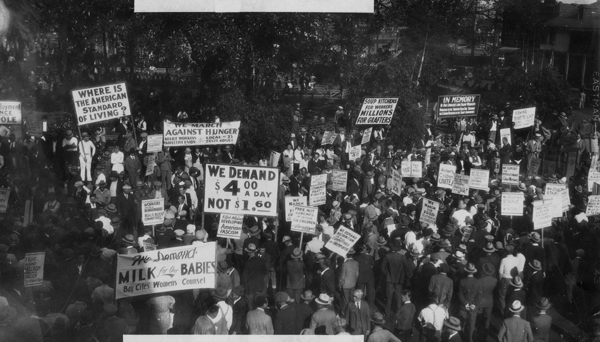Fighting Climate Change in Portlandia
Not only is failure not an option, those fighting to avert cataclysmic climate change have achieved important successes worthy of celebrating.

(1) Cover Story Posted: Where Are Today's Mass Movements?: We have posted the cover story for our current issue, Where Are Today's Mass Movements?, by Trudy Goldberg. The subtitle is "What we can learn from the millions who demonstrated for jobs, government relief, and collective bargaining rights in the 1930s," and Trudy gives a detailed answer based on the organizing of the unemployed and in the labor movement. Three key differences between then and today are: that the numbers of unemployed increased much more precipitously in the 30s, and to much higher rates (to a high of 25%); that there was no government relief for the unemployed back then, whereas today food stamps, unemployment compensation, and other programs, themselves the inheritance of the activism that led to the New Deal, helped protect the unemployed from the worst ravages; and that there were "ideologically committed organizers"--especially from the Communist Party. (See the photo above from a Communist-led rally in Los Angeles in 1933; the placards are amazingly resonant today: "Soup Kitchens for Workers, Millions for Grafters"; "Tax the Rich"; etc.). Trudy also mentions the key role for the labor movement of government officials, like Robert Wagner, Frances Perkins, and FDR, who are even mildly supportive.
(2) Tom Engelhardt: Why There Is No Massive Antiwar Movement in America: Tom Engelhart of TomDispatch has a piece there about a later era of mass movement action, the 60s and 70s: Remembrance of Wars Past: Why There Is No Massive Antiwar Movement in America. The subtitle promises to answer a similar question to Trudy's. The piece is interesting as memoir--Engelhardt talks about the anti-war press, and I.F. Stone's Weekly in particular, but his main conclusion seems to be that, in his own personal case at least, the call to serve one's country, as embodied in JFK's famous "Ask not..." from his inaugural, and disillusionment with the government, led to antiwar activism. He describes his own early anti-war journalism for Pacifica, and then says:
That, I suspect, is what’s gone missing in much of our American world and just bringing back the draft, often suggested as one answer to our war-making problems, would be no ultimate solution. It would undoubtedly change the make-up of the U.S. military somewhat. However, what’s missing in action isn’t the draft, but a faith in the idea of service to country, the essence of what once would have been defined as patriotism. At an even more basic level, what may be gone is the very idea of the active citizen, not to speak of the democracy that went with such a conception of citizenship, as opposed to our present bizarro world of multi-billion-dollar 1% elections.
Very interesting as memoir, but I'm not sure it goes very far to answer the question of why there's no antiwar movement today (or no mass movements in general).
(3) More on SYRIZA: The European Central Bank is not playing nice with SYRIZA. Mike Epitropoulos is working on another blog post for us, but in the meantime, here are some pieces on the situation:
The last one is a petition that you can sign (if you're a scholar, I guess). And Yves Smith has promised an update on the situation on Monday on Naked Capitalism.